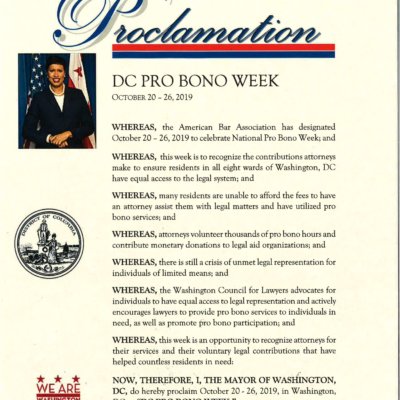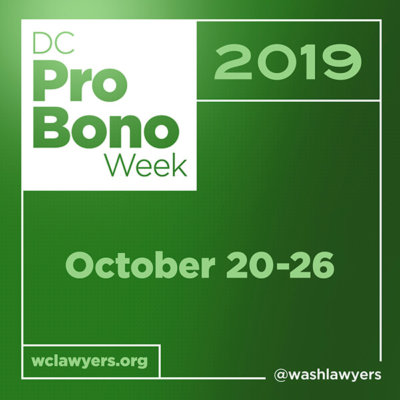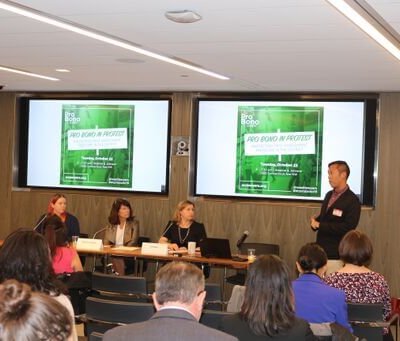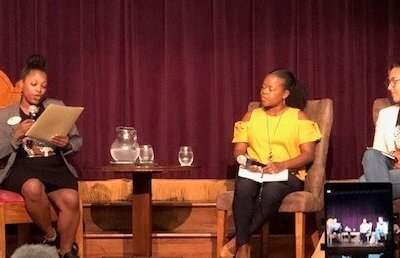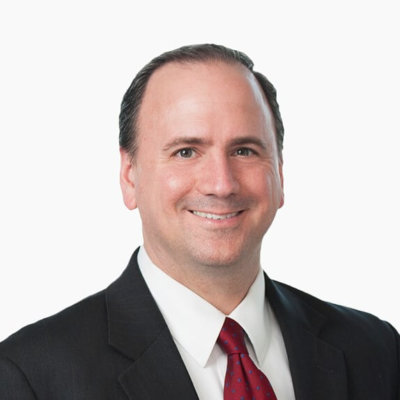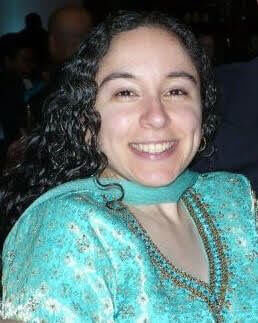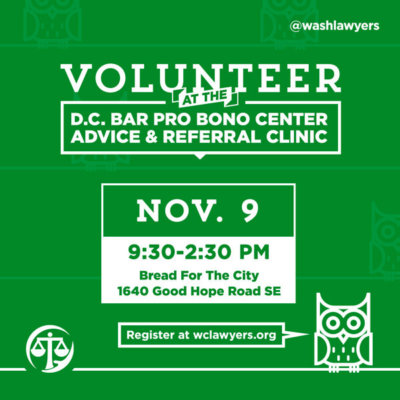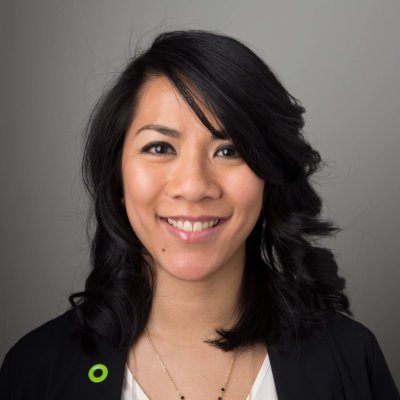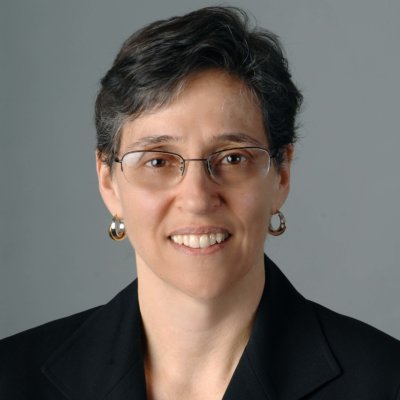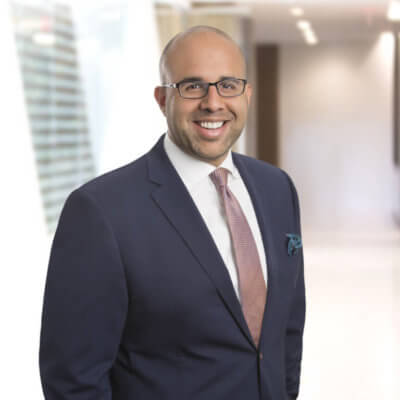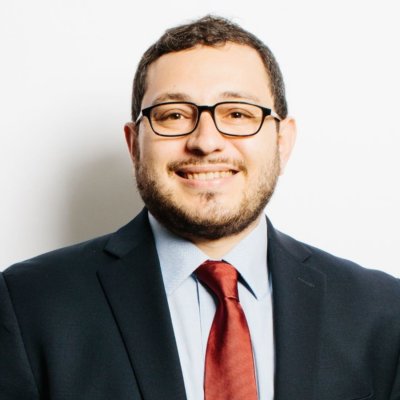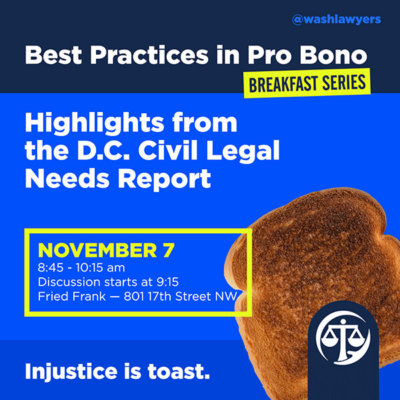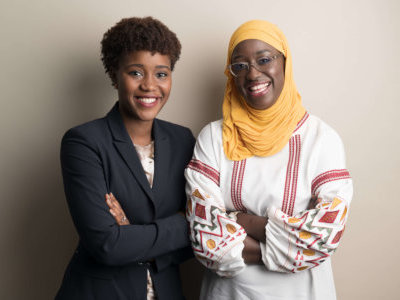DC Pro Bono Week 2019 Profiles: Complete Set
Pro Bono in Protest: Protecting First Amendment Freedoms in the District
Discussing Black Maternal Health and Domestic Violence
Every year, pregnancy-related complications kill about 700 women. That’s bad enough, but the racial disparity makes it even worse: Compared to white women, black women are three times more likely to die because of pregnancy. Ujima: The National Center on Violence Against Women in the Black Community wants more people to learn about this gap and, more generally, that too many black women and black babies suffer avoidable deaths. Ujima provides culturally specific services and resources about domestic, sexual, and community violence. Says its Executive Director, Gretta Gardner, "We hope to bring awareness that will spur conversations in the community about how we have to rely on each other to reduce harm and raise awareness instead of relying solely on systems and institutions." So two weeks ago (on Monday, October 14), Ujima held an event at Busboys and Poets in Anacostia to discuss black maternal health and how it relates to domestic violence. The program was one of over thirty District events held in October for Domestic Violence Awareness Month. Moderated by Ujima Senior Policy Attorney Megan Simmons, the panel featured two reproductive-rights leaders: Dr. Jamila Perritt (a local OBGYN and member of the District's Maternal Mortality Review Committee) and Jessica Pinckney (Vice President of Government Affairs at In Our Own Voice: National Black Women's Reproductive Justice Agenda). The panelists were blunt about the relationship between domestic violence and maternal health. "Many folks who will someday become pregnant or potentially become mothers or parents have often experienced some type of abuse or violence in their life," said Pinckney. And "there is no way to separate the trauma or that experience from both the experience of being pregnant and the experience of being a parent." In fighting these problems, the panelists stressed, there's no substitute for knowing about reproductive justice and its history. As Dr. Perritt explained, "If you don’t understand reproductive justice, you will continue to see inequities." And, she added, "you can’t understand the inequalities with medical care unless you understand the history." Because of this history, for instance, some African-Americans distrust medical professionals; that distrust can affect the quality of care delivered and received. As a result, doctors and other medical providers need to ask better questions to learn whether someone is a victim of violence: "You have to ask if something is going on." Unfortunately, quite a bit is going on. According to the National Network to End Domestic Violence, last year District domestic-violence organizations served an average of 589 victims—each day. Bit by bit, groups like Ujima are working to change that. Learn more about Ujima, Inc. here.
Pro Bono Week 2019: Paul Thompson – Appellate Pro Bono
Pro Bono Week Profiles 2019: Jane Garrido – Making Housing Vouchers Work
Volunteer at the D.C. Bar Pro Bono Center’s Advice & Referral Clinic (November 2019)
DC Pro Bono Week may have ended, but the need for volunteers to provide legal help to those in our community is non-stop! Volunteer with us on Saturday, November 9, at the D.C. Bar Pro Bono Center's Advice & Referral Clinic. At the clinic, you'll provide brief advice (and referrals) to people who otherwise wouldn't have access to legal help. We meet at Bread for the City (1640 Good Hope Road SE). Parking is available. A brief orientation (with bagels and coffee) takes place at 9:30 am, and volunteers are asked to stay until the last client is seen, usually at around 2:30 pm. There's no time commitment beyond the clinic itself. As a volunteer attorney, you'll answer questions about consumer law, family law, housing law, public benefits, bankruptcy, and other topics. You don't need to be an expert in these areas of law: D.C. Bar Pro Bono Center staff and expert mentors will be on hand to help. You do need to be a member of the D.C. Bar, or a federal government attorney barred in another state to participate. Once you register to attend, our volunteer coordinator, Sébastien Monzón Rueda, will be in touch with additional details.
Pro Bono Week 2019: Tammy Hui – Inspired by the Entrepreneurial Spirit
Pro Bono Week 2019: Karen Zacharia – Prioritizing Pro Bono
Pro Bono Week 2019 Profile: Jody Cummings – Removing the Barrier of a Criminal Record
Pro Bono Week 2019 Profile: Bez Stern – Representing Unaccompanied Children
Best Practices in Pro Bono: Civil Legal Need in the District
Our November Best Practices in Pro Bono features a conversation with Nancy Drane, Executive Director of the DC Access to Justice Commission, previewing some highlights of the Commission’s forthcoming report, Delivering Justice: Addressing Civil Legal Needs in the District of Columbia. Nancy will focus on some of what the Commission learned about civil legal needs in our community, the progress we've made, and what the future may hold. How has the civil legal services community innovated, adapted, and changed since the last Legal Needs Report was issued in 2008? What new areas of need have emerged? What are some of the barriers that low- and moderate-income District residents still face? What is the role of pro bono in moving the needle on our local legal needs? What might be some of the next frontiers in access to justice in the District? Breakfast and networking take place from 8:45-9:00 am. The conversation, facilitated by Lise Adams of the D.C. Bar Pro Bono Center, takes place from 9:00-10:15 am. Thank you to Fried Frank for hosting! Best Practices in Pro Bono is open to pro bono coordinators at law firms, legal services organizations, government agencies, and in-house legal departments. We hope you will join us on Thursday, November 7 – first, to get your morning caffeine buzz, and then, to hear all the buzz about the Commission’s report.







